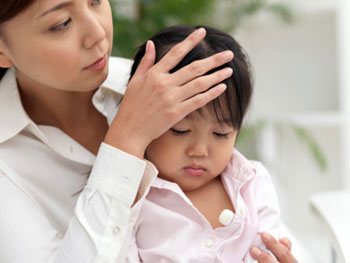Reducing fever will slow recovery?
This winter, millions of parents will give children a fever-reducing medicine. But now many doctors and researchers believe that parents and doctors worry too much about fever in children.

Fever helps reduce the proliferation of germs
There is evidence that the fever is beneficial.'This is a way for the body to fight infection. Viruses and bacteria are very sensitive to temperature. Each time the body temperature rises to 40 ° C, their replication rate will be reduced. '
The study published in the Lancet scientific journal on 50 children with malaria shows that a decrease in body temperature will slow the patient's recovery process.
Patients who take paracetamol and quinine will prolong the duration of 'elimination' of the whole organism more than those who only take quinine for 16 hours.
The study at the University of Miami (USA) showed that patients with a fever of 38 o 5 were in a hurry to reduce fever, the condition would be worse than those treated only with 40 ° C fever.
And reducing fever can slow the recovery time because high temperatures help kill pathogenic bacteria. Specifically, researchers at Great Ormond Street Hospital said: after 4 hours, the meningitis bacteria living in 37 o C environment will multiply faster than when in the environment of 40 o C.
'Fever is one of the body's important reactions that helps control the' expansion 'of bacteria in the early stages of the disease,' the researchers noted.
Anxiety due to high fever
Many studies show that 20-50% of parents give their children high doses of paracetamol or ibuprofen to reduce fever. Fever is recognized by body temperature exceeding 37.5oC. The biggest worry is often: is it a manifestation of a serious disease. So if your child has trouble sleeping, has a rash, chills, stiff neck or difficulty breathing, you should seek medical care immediately. But most fever is caused by an infection and it will go away on its own after a few days.
However, parents worry that increased body temperature will lead to fever disorders. 'The idea of a high fever is usually larger than the actual body temperature. And then they find ways to reduce fever for children by all means, including overdose, because they are really afraid of fever-induced physical disorders (accounting for 3-5% of children under 5 years old and mostly seizures. The whole body and not more than a few minutes, rarely lasts) ' , Dr. Clinch said.
'Fever is a symptom, not a disease. It is thought that giving children a fever-reducing medicine will help children be more comfortable with the analgesic effect (such as sore throat, for example) , 'said Dr. Anthony Harden, Oxford University Health Care clinic.
Those who agree with the idea of not using fever-reducing medicine for children have been cited as a guide by the National Institutes of Health and Health (NICE): 'Unusually give children fever-reducing medicines just because of the item target hypothermia '.
Prof. Stephen Field, Royal University, emphasized: 'Do not use fever-reducing medicine just for the purpose of hypothermia but if your baby is uncomfortable or uncomfortable then we recommend taking medicine'.
- Signs of distinguishing dengue and H1N1 flu
- What you need to know when your body has a fever
- How to identify children with dengue fever
- Fever - when do I need to go to the hospital?
- Why is the browser running slow and how to fix it?
- Things to know when having a viral fever
- Dance screen of colorful paint drops under slow-motion view
- What is your fever?
- How is dengue outbreaks raging?
- What should I do and how to eat and drink when I have dengue fever?
- Against dengue fever is stalking
- Signs that your child should have a viral fever should know
 Green tea cleans teeth better than mouthwash?
Green tea cleans teeth better than mouthwash? Death kiss: This is why you should not let anyone kiss your baby's lips
Death kiss: This is why you should not let anyone kiss your baby's lips What is salmonellosis?
What is salmonellosis? Caution should be exercised when using aloe vera through eating and drinking
Caution should be exercised when using aloe vera through eating and drinking